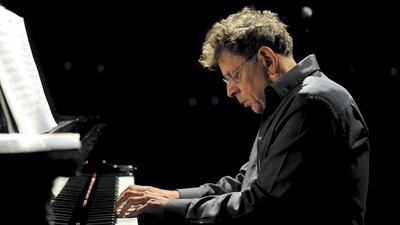A wondrous moment in the experimental 1983 film Koyaanisqatsi arrives when a propulsive montage of urban life, with frenetic images of traffic jams and heaving machinery of factories, segues into slow and eerie nocturnal aerial footage of a vast metropolis.
The passage is called The Grid, named after the haunting score by US composer Philip Glass.
Directed by Godfrey Reggio, the non-narrative film and associated soundtrack are viewed as pioneering feats of their respective forms. The film set a new bar of how sound and vision work together to create a visceral and emotional viewing experience.
That powerful fusion can be experienced in Thursday’s cine-concert of Koyaanisqatsi by the Philip Glass Ensemble at NYU Abu Dhabi Arts Centre.
While named after the composer, the group often performs his work without him.
Speaking to The National, conductor Michael Riesman explains that the meticulous editing of Koyaanisqatsi means there is no room for error during performances.
“It is technically demanding because you are a slave to the speed of the film and its events, therefore you don't have the freedom to just play the music,” he says.
“We have to focus a good deal of attention on where we are during the film and try to be in sync as much as we can.”
The chance of the group being off beat is slim, as the ensemble is intimately familiar with the work.
Riesman was invited by Glass – whose career was honoured with the Abu Dhabi Festival Prize in 2017 – to join the collective nearly 50 years ago, and he is one of the original members to record the Koyaanisqatsi score.
“We never thought about how important or influential the music would become,” he says. “As an ensemble we made demos from sketches that Philip would make on just a synthesiser and organ to give us an impression of what the music would be like.
“What I immediately picked up on is how orchestral it all sounds because the chorus and big brass section play an important role here.”
These elements prevail in The Grid, which Riesman promises will be played loud and proud.
“We are going to have a big sound system so it will sound powerful,” he says. “I find that at the end of playing The Grid, people almost have their breath taken away, so there is nothing you need to know about it ahead of time.
“It's immediate, harmonic and rhythmically exciting. It's like rock 'n' roll but with no drums, guitars and lyrics.”
The track also challenges some of the prevailing perceptions regarding Glass's work. Viewed as a leader of the minimalist music movement in the 1960s, focusing on repetitive patterns and elongated melodies, Riesman says Glass’s oeuvre is more rounded than generally perceived.
“The work that he did seeped into popular musicians such as David Bowie and the group Talking Heads who were all listening to Glass,” he says. “But I think the term is more applicable to his earlier pieces because over the decades he has been adding all these orchestral and operatic elements to his work.
“What really binds them together is that they are listenable and powerful."
Koyaanisqatsi Live by the Philip Glass Ensemble is on at the NYU Abu Dhabi Arts Centre on Thursday, 7.30pm. Tickets are priced Dh52.50 and available on nyuad-artscenter.org


